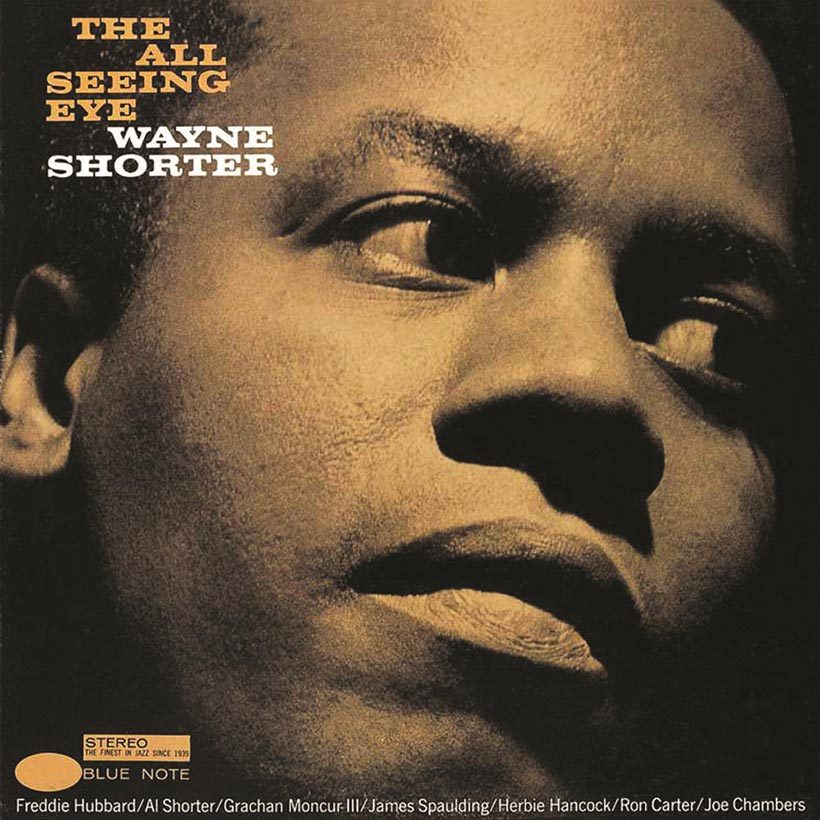‘The All Seeing Eye’: Discover Wayne Shorter’s Metaphysical Masterpiece
Described by Wayne Shorter as an album about life, the universe, and God, ‘The All Seeing Eye’ remains one of its creator’s most ambitious works.

On Friday, 15 October 1965, Wayne Shorter recorded one of his most progressive albums for Blue Note: The All Seeing Eye. Back then, Shorter, then 32, was a key member of jazz pathfinder Miles Davis’ quintet, having joined the trumpeter’s band the previous year. That was also when the New Jersey saxophonist began a parallel solo recording career at Blue Note Records.
Listen to The All Seeing Eye on Apple Music and Spotify.
Shorter’s debut album for Alfred Lion and Frank Wolff’s iconic jazz label was Night Dreamer, recorded in April 1964; a few months later, he cut what became his second LP, Juju. By the time that he went into Rudy Van Gelder’s New Jersey recording studio to lay down the tracks for The All Seeing Eye, Shorter had already produced six albums for the label in an amazingly fertile 18-month period.
The All Seeing Eye came in the wake of The Soothsayer and Etcetera, two Shorter LPs from earlier 1965 sessions that were held over by Blue Note until a much later date (they didn’t actually see the light of day until 1979 and 1980, respectively). Melodically, harmonically and conceptually, The All Seeing Eye proved markedly different from Speak No Evil, Shorter’s previous album on Blue Note.
“A wider range of colours and textures”
The Newark-born saxophonist’s reputation as a composer was blossoming at this point, and for The All Seeing Eye he led a much larger ensemble than on his previous studio dates. Joining him in the studio were two of his colleagues from the Miles Davis band – pianist Herbie Hancock and bassist Ron Carter – plus trumpeter Freddie Hubbard (who doubled on flugelhorn), alto saxophonist James Spaulding, trombonist Grachan Moncur III, and drummer Joe Chambers. On the album’s final track, the septet expanded to an octet with the addition of Shorter’s elder brother, Alan, on flugelhorn.
Though the saxophonist had served his apprenticeship in Art Blakey’s “hard bop academy”, The Jazz Messengers, from 1959-64, The All Seeing Eye – whose title referred to the omniscience of God – seemed a world away from so-called straight-ahead jazz. Shorter described the album as “about life, the universe and God”, and brought his vision to life by using, he said, “a wider range of colours and textures”. The music was bold, uncompromising, and exploratory, and had more in common with the modal approach of John Coltrane and the free jazz experimentation of Ornette Coleman, though ultimately its uniqueness meant that it could have only come from the mind of Wayne Shorter.
The lengthy title song begins with a stately four-part brass fanfare – Shorter’s musical representation of God surveying his work – before Joe Chambers’ thundering drums initiate a faster tempo. He’s joined by Ron Carter’s fast-walking bass, and together they establish a swirling swing rhythm over which there are long, discursive solos by the main protagonists.
Beginning with portentous low piano notes, “Genesis” is Shorter’s sonic depiction of the act of creation and is defined by a succession of different moods, rhythms and textures that imply something unfurling gradually but continuously. “There are clusters of starts, species of life,” Shorter explained to journalist Nat Hentoff in 1965. “I tried to give ‘Genesis’ a feeling of open-endedness because, once begun, the creative process keeps going.”
The pulsating “Chaos” is a fast, fiery number driven by Carter and Chambers’ constant rhythmic pulse, which keeps the music flowing while maintaining its inherent sense of tension. Over this maelstrom, Shorter lets rip with a violent solo. Ruminating on the track, he later explained, “‘Chaos’ is what man has done, to a certain extent, to God’s creation. The music mirrors conflicts, wars, disagreements – the difficulty men have in understanding each other.”
“The Devil is unpredictable”
After the confusion of “Chaos” comes the repose of “Face Of The Deep,” which Shorter explained as “God reflecting on what he has created.” As such, it’s a calmer, meditative and more measured piece defined by exquisite brass interplay.
With its tense, almost chilling ostinato rhythms, “Mephistopheles,” the album’s finale, is much more ominous. Intended as a musical portrait of the Devil, it was composed by Shorter’s flugelhorn-playing brother Alan. “It’s asymmetrical,” observed Shorter in the album’s original sleevenotes. “The melody moves in an unpredictable way because the Devil is unpredictable.”
On its release, in 1966, The All Seeing Eye’s cosmic vision and radical “free bop” aesthetic certainly attracted attention. Though regarded as one of the most challenging LPs in Wayne Shorter’s Blue Note canon, it’s certainly worth rediscovery. The album may have been overshadowed by more popular works the likes of Speak No Evil, but it has grown in stature over the years, and sounds as strikingly fresh and modern as it did when it was recorded.
Though it was the first example of Wayne Shorter exploring metaphysics through music, it wasn’t the last, as his 2018 album, the comic-book-inspired Emanon, clearly shows. By the time of that recording, of course, the young lion had become an old master, but the sense of curiosity, wonder and vision he displayed on The All Seeing Eye remains an abiding feature of Shorter’s work.













Karl Induss
December 25, 2023 at 10:21 pm
Thnx for the review!